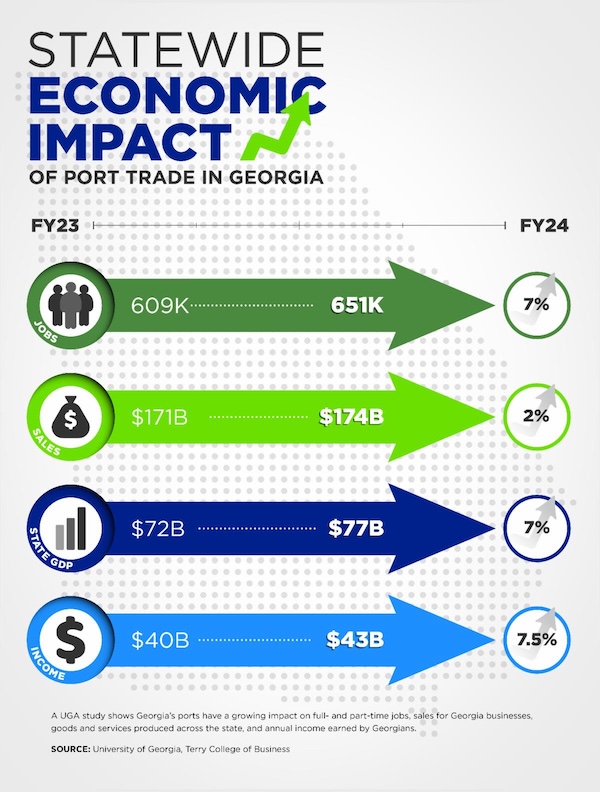Georgia Ports Economic Impact Jumps 7% in 2024
Wednesday, August 27th, 2025
Port activity in Georgia now supports 650,965 full- and part-time jobs across the Peach State, according to an economic impact study by the University of Georgia’s Terry College of Business. The statewide number has grown by 41,770 jobs or 7 percent compared to fiscal year 2023, the period covered by the previous study. Georgia Ports now help sustain 12 percent of total state employment, according to the study.
“Georgia has been recognized as the No. 1 state for business for over a decade in part because we're also the best state for reliable infrastructure,” said Governor Brian Kemp. “As powerful economic drivers, the Ports of Savannah and Brunswick are a key part of the pro-job creator environment we’ve fostered to ensure every part of our state can thrive.”
“Georgia’s ports are one of its strongest economic engines, fostering the development of virtually every industry,” said Jeff Humphreys, director of the Selig Center for Economic Growth, who conducted the study. “The ports are especially supportive of other forms of transportation, logistics, wholesale/distribution centers, warehousing, manufacturing, agriculture, forestry, and mining.”
According to the new findings, the statewide economic impact of Georgia’s deepwater ports in fiscal year 2024 (July 1, 2023-June 30, 2024) includes:
-
$174 billion in sales, accounting for 11 percent of Georgia’s total sales, an increase of 2 percent or $3 billion compared to FY2023.
-
$77 billion in state GDP, or 9 percent of Georgia’s total GDP, up 7 percent or $5 billion compared to FY2023.
-
$43 billion in income, amounting to 7 percent of Georgia’s total personal income, an increase of 7.5 percent or $3 billion compared to FY2023.
GPA’s top three export commodity groups for the study period were forest products, food and automotive cargo. The top imports were machinery, retail goods and furniture.
“At Georgia Ports, we’re proud to be part of a team where everyone is pulling together in the same direction for success,” said GPA President and CEO Griff Lynch. “From the leadership of Gov. Kemp and our state legislature, to the outstanding work of the Georgia Department of Economic Development and our logistics community, a customer-centered focus is driving job growth across the state.”
Trade through Georgia’s ports also helps to support government services, yielding $10 billion in federal taxes, $3 billion in state taxes, and $3 billion in local taxes annually.
“I would like to thank our GPA employees, our partners at Gateway Terminals, at the International Longshoremen’s Association, and throughout the logistics industry,” said GPA Board Chairman Alec Poitevint. “Their dedicated efforts to keep Georgia’s economy thriving are essential to the kind of growth detailed in this latest report.”
Poitevint noted the terminal improvements Georgia Ports is making to support growth are self-financed through port proceeds and do not rely on taxpayers. The Port of Savannah handles 35 weekly vessel services, 14,000-16,000 truck moves per day and 42 double-stack trains per week. The Port of Brunswick became the nation’s busiest gateway for autos and heavy equipment in 2024, moving 901,000 units of Roll-on/Roll-off cargo.
The UGA study, “The Economic Impact of Georgia’s Deepwater Ports on Georgia’s Economy in FY 2024” is the latest in a series of similar studies conducted by the Selig Center for Economic Growth.



